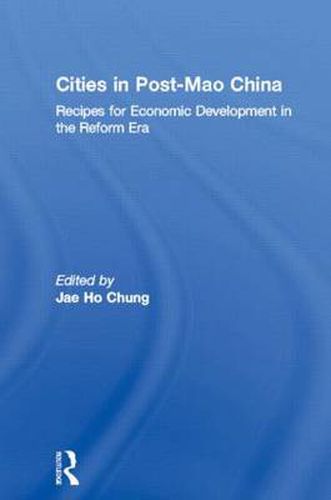Readings Newsletter
Become a Readings Member to make your shopping experience even easier.
Sign in or sign up for free!
You’re not far away from qualifying for FREE standard shipping within Australia
You’ve qualified for FREE standard shipping within Australia
The cart is loading…






Until now, Chinas eye-catching economic performance over the last two decades has only been examined from macro-national perspectives. However, since post-Mao Chinas reform strategy has been predominantly regional in nature, bringing down the level of analysis is a key to understanding Chinas remarkable success. This book, for the first time, focuses on sub-provincial cities as territorially based entrepreneurial agents. More importantly, Cities in Post-Mao China provides the widest coverage in the field of contemporary China studies, by comparing the developmental recipes of fourteen cities in eight provinces. Developmental experiences of these cities are analysed using a framework of three categories: the given endowments of location and history; the administrative arrangements and target policies granted by central and provincial governments; local entrepreneurial leaders and locally generated strategies of reform and opening. Case studies cover: six deputy provincial cities in five provinces (Dalian, Qingdao, Hangzhou, Xiamen, Guangzhou, Chengdu); three prefecture level cities (Wenzhou, Nantong, Fuzhou); three county level cities (Panyu, Nanhai, Zhangjiagang); and two provincial level cities (Tianjin, Chongqing) This volume, written by contributors from a number of different specialisms, suggests that different combinations of factors have contributed to the relative successes and failures in these cities. Endowment factors, preferential policies, and history have all proved to be important. Most importantly, Cities in Post-Mao China suggests that locally-generated strategies of development are crucial determinants. This ground-breaking volume reveals through close detail and broad coverage how exactly cities have been catalysts for Chinas economic development. It will provide much needed data for those working in the fields of comparative politics, development studies, economic development and Asian studies.
$9.00 standard shipping within Australia
FREE standard shipping within Australia for orders over $100.00
Express & International shipping calculated at checkout
Until now, Chinas eye-catching economic performance over the last two decades has only been examined from macro-national perspectives. However, since post-Mao Chinas reform strategy has been predominantly regional in nature, bringing down the level of analysis is a key to understanding Chinas remarkable success. This book, for the first time, focuses on sub-provincial cities as territorially based entrepreneurial agents. More importantly, Cities in Post-Mao China provides the widest coverage in the field of contemporary China studies, by comparing the developmental recipes of fourteen cities in eight provinces. Developmental experiences of these cities are analysed using a framework of three categories: the given endowments of location and history; the administrative arrangements and target policies granted by central and provincial governments; local entrepreneurial leaders and locally generated strategies of reform and opening. Case studies cover: six deputy provincial cities in five provinces (Dalian, Qingdao, Hangzhou, Xiamen, Guangzhou, Chengdu); three prefecture level cities (Wenzhou, Nantong, Fuzhou); three county level cities (Panyu, Nanhai, Zhangjiagang); and two provincial level cities (Tianjin, Chongqing) This volume, written by contributors from a number of different specialisms, suggests that different combinations of factors have contributed to the relative successes and failures in these cities. Endowment factors, preferential policies, and history have all proved to be important. Most importantly, Cities in Post-Mao China suggests that locally-generated strategies of development are crucial determinants. This ground-breaking volume reveals through close detail and broad coverage how exactly cities have been catalysts for Chinas economic development. It will provide much needed data for those working in the fields of comparative politics, development studies, economic development and Asian studies.